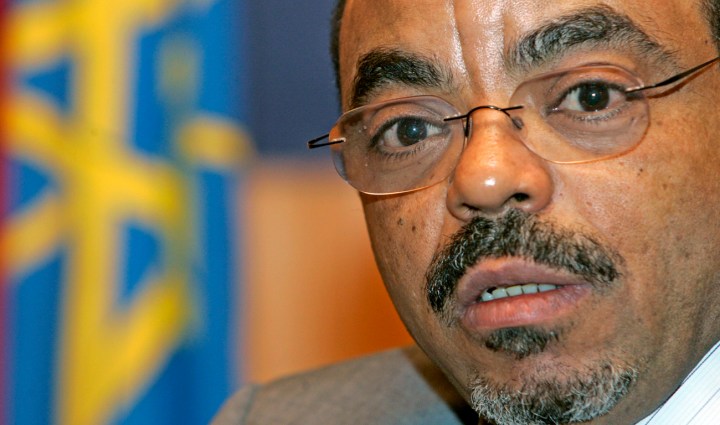Africa
Meles Zenawi and the death of the African Renaissance

For once, the rumours about Meles Zenawi’s death were true. SIMON ALLISON looks at the legacy of the Ethiopian prime minister who fell far short of his early promise.
Far from home, and in great secrecy, Meles Zenawi died shortly before midnight on Monday. Where, exactly, no one’s sure. Of what, we can only speculate. We do know it is true—even Ethiopian state media is reporting the prime minister’s death as fact. In this instance, if no other, state media is probably the most reliable source.
Zenawi has died many times on the Internet over the past few months, rumours fuelled by his strange and unexplained absence from public life. He had not been seen in public since the G20 summit in Mexico, where he looked his usual self—calm, serious and intelligent. Eventually, officials admitted he was ill and seeking treatment abroad; yet another African president who refused to put his own life in the hands of the health system he built.
He was getting better, we were told. As late as Sunday, Ethiopian Information Minister Bereket Simon informed the country that Zenawi would be back to work shortly. He’d just been resting, apparently. “The PM’s health is in a very good condition…the PM will certainly return to office and resume duty soon.”
Instead, Zenawi has left his post and gone off to that great African Presidential Palace in the sky, another name on the disturbingly long list of African heads of state who have died in office over the past few years. He is the fourth this year alone, after Guinea-Bissau’s Malam Bacai Sanha, Malawi’s Bingu wa Mutharika and Ghana’s John Atta Mills.
Once upon a time, the hopes of a continent rested on Zenawi’s shoulders. He came to power in 1991, leading a rebel movement which ousted dictator Haile Mengistu Mariam, and immediately implemented democratic and political reforms. By the mid-1990s, he had earned himself a spot as one of Bill Clinton’s infamous “new generation” of African leaders, alongside other promising figures such as Eritrea’s Isaias Afwerki, Rwanda’s Paul Kagame and Uganda’s Yoweri Museveni. These were the men who would overturn all those stereotypes about corrupt, venal and selfish African presidents. These were the men who would lead the African Renaissance.
It wasn’t much of a renaissance. Barely had the term been coined before Ethiopia and Eritrea were at each other’s throats in a vicious border war, never mind that Afwerki and Zenawi had supported each other closely during their respective liberation struggles and were even said to be distantly related. Kagame too was fighting, having fanned the flames in the DRC with such success that a minor rebellion turned into an eight country African war. Museveni, meanwhile, was building on his impressive reputation for corruption and entrenching himself as Prime Minister for life.
On the domestic front, Zenawi was little better. For a man who had hitherto spent most of his life fighting Mengistu, it was a surprise to see Zenawi employ similar policies of intimidation, oppression and censorship to maintain control. His administration was consistently criticized for jailing journalists and dissenting voices and for marginalizing other ethnic groups, both economically and politically. He oversaw the installation of Africa’s most sophisticated electronic surveillance system, making it dangerous to criticize the government in calls or online, and deliberately sidelined Ethiopia’s very large Muslim minority (some say it is actually a Muslim majority which the largely Christian government is attempting to subvert).
Zenawi’s main focus, however, was the economy. During his 21 years as head of state, he earned himself two university degrees in business through distance learning and put the lessons learned into practice. Betraying his Marxist roots, the prime minister welcomed outside investment and presided over consistent economic growth; if maintained, Ethiopia could enter the ranks of middle-income countries in a few years’ time. This is an astonishing about-turn from a country that was – and often still is—synonymous with African poverty and starvation, and Zenawi deserves much of the credit.
While reports indicate Zenawi’s deputy and Foreign Minister Hailemariam Desalegn will succeed the prime minister in the short term, his death is certain to prompt a reorganization of political power, both within the ruling coalition and within the country as a whole. Most interesting will be to see how Ethiopia’s Muslim community, which has been protesting about government interference for weeks, reacts to the news.
In the end—and, for Zenawi, this really is the end—Zenawi never fulfilled his early promise. He betrayed his democratic pretensions with rigged elections and old-school intimidation. He betrayed his people with mindless wars and often brutal repression. Even his oft-lauded economic achievements are uncertain; the Economist recently reported on suspicions that the statistics were fiddled to present a picture of a thriving economy that doesn’t really exist.
And finally, he betrayed a continent that for a while believed the likes of Zenawi, Afwerki, Kagame and Meseveni would be different, and better, than the old guard of autocrats and dictators. The African Renaissance, as represented by Clinton’s “new generation” of African leaders, died a long time ago. Zenawi’s death is just another nail in its coffin. DM
Read more:
- Ethiopian Prime Minister Meles Zenawi dies after illness, in the Guardian;
- Why do African presidents keep dying? in Daily Maverick.
Photo: Meles Zenawi (Reuters)


















 Become an Insider
Become an Insider